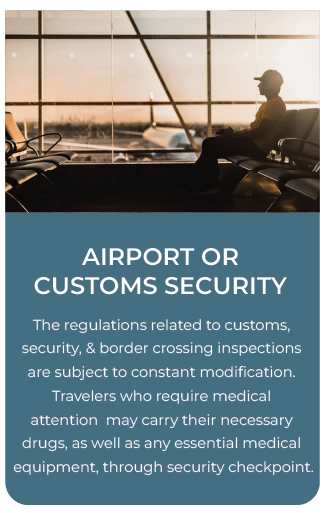- cedarbraeph@gmail.com
- +1 416-283-1786

Travelling is a rewarding experience that will expand your horizons and expose you to new languages, foods and cultures. Whether you travel for fun or for work, taking a few simple measures could spare you from finding yourself in situations that may put the health of you or your family at risk.
While traveling, your chances of getting sick are higher because you are exposed to new environments. Consulting your pharmacist is a wise move to ensure that you are well-prepared for your trip.
Preparing yourself adequately is essential for ensuring a stress-free travel experience. Regardless of whether you are travelling by car, train, or plane, prolonged periods of sitting without moving your legs can increase your likelihood of developing a blood clot. Learn about the measures you can take before your journey and how your pharmacist can assist you in avoiding typical travel setbacks.




Proper preparation is essential for ensuring a stress-free travel experience. Explore our recommendations and suggestions in the sections below.
Insect and tick bites can be painful, cause inflammation, and transmit illnesses such as Lyme disease. Ticks are tiny insects, usually found in fields and woods, that can be just a few millimeters in size. They are present in numerous locations worldwide, including Europe, Canada, and the United States. Ticks can attach themselves to the skin after biting, and they can transmit diseases like Lyme disease through their saliva without causing any pain.
To avoid tick bites, it is recommended that you take the following precautions:
Your pharmacist can provide valuable information about whether the area you are visiting is susceptible to ticks and mosquitoes, as well as recommend suitable products to keep you protected.
Zika virus is mainly spread through the bite of Aedes mosquitoes, which are active during the day. Most people infected with the virus do not experience symptoms, while those who do typically suffer from fever, rash, joint and muscle pain, headache, and malaise that may last for up to seven days.
Zika virus infection in pregnant women can result in congenital abnormalities like microcephaly and preterm birth, as well as Guillain-Barré syndrome, neuropathy, and myelitis in adults and children. Currently, there is no specific treatment available for the Zika virus or its symptoms.
Individuals with symptoms such as fever, rash, or joint pain should rest, drink plenty of fluids, and manage their symptoms with antipyretics and/or analgesics. Nonsteroidal anti-inflammatory drugs should be avoided until dengue virus infections are ruled out because of the risk of bleeding. Patients whose symptoms worsen should seek medical attention.
Pregnant women who live in areas where Zika is prevalent or who develop Zika virus symptoms should receive medical care, laboratory testing, counseling, and other clinical care.
Malaria is a severe disease typically found in tropical countries that can be fatal if left untreated. It is preventable and curable, but delayed diagnosis and inadequate treatment can lead to a more severe form of the disease that can be deadly.
Certain individuals are at a higher risk of developing severe malaria compared to others. This includes infants, children under the age of 5, pregnant women, and those who have HIV/AIDS.
Malaria symptoms typically start showing within 10-15 days of being bitten by an infected mosquito. The initial signs usually include fever, headache, and chills. However, these symptoms can be mild and hard to identify as malaria. In regions where malaria is prevalent, some individuals may get infected but not show any symptoms (asymptomatic infections), especially those with partial immunity.
Protective measures against mosquito bites should be taken along with anti-malarial medications. The most commonly used medications to prevent malaria are:
These prescription medications should be taken before entering a malaria zone to reduce the risk of contracting malaria after being bitten by a mosquito. The medication should also be taken during the trip and for a specific duration after leaving the malaria zone. Completing the entire treatment course is strongly recommended to prevent the parasite from multiplying as it can hide in both the liver and blood.
Although summer is a great time to spend outdoors and have fun, it can also be dangerous due to overexposure to the sun’s ultraviolet (UV) rays, which can result in skin and health problems. However, you can protect yourself by following appropriate skincare practices and adhering to our beach safety recommendations, allowing you to have a safe and enjoyable summer vacation.
To begin with, here are some recommendations:
Avoid direct sunlight and seek shade.
Select the appropriate sunscreen product.
Protect yourself with clothing.
Take precautions when around water and sand.
Monitor the UV index level.
If you are unsure about how to safeguard your skin from the harmful effects of the sun, seek advice from your pharmacist. They will suggest the appropriate measures based on your skin type and any medical issues, enabling you to make the most of your outdoor activities without compromising your skin’s health